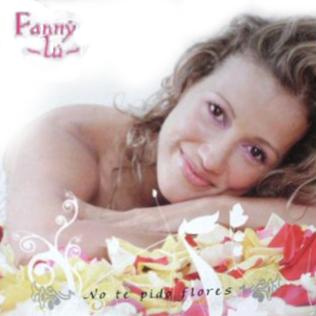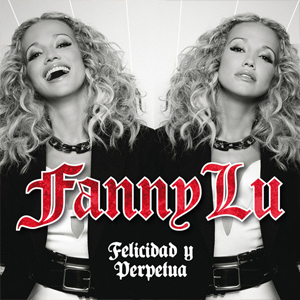"Pose" is the first single by Puerto Rico reggaeton artist Daddy Yankee from the movie soundtrack to the motion picture Talento de Barrio, and was released on May 14, 2008, by Machete Music and El Cartel Records. The single was made available through online music stores on August 12, 2008. The song features different musical styles, ones that differ from Daddy Yankee's past singles. It is an electro song, which fuses other genres such as latin pop, dance-pop, pop rap, dance, hip hop and pop, as well as Latin and dance rhythms.

"Tú Y Yo" is the first single from Thalía's 2002 self-titled album Thalía. The song was written by Estéfano and Julio Reyes, and produced by Estéfano. An English-language version was included on Thalia's 2003 English-language album, also titled Thalia. It topped the charts reaching number one at Billboard's hot Latin tracks, becoming her second number one single on this chart. The song also received airplay in European countries like Greece and Spain.

Fanny Lucía Martínez Buenaventura, better known professionally as Fanny Lu, is a Colombian singer, songwriter, and actress from Santiago de Cali, Colombia. She studied at the University of the Andes and received a degree in industrial engineering. She is the mother of two children, Mateo and Valentina.

"En El Jardín" is a song written by Kike Santander and performed by Mexican recording artist Alejandro Fernández. It was co-produced by Santander and Emilio Estefan and features Cuban-American singer Gloria Estefan. It was released as the second single from Me Estoy Enamorando by Sony Music Mexico in 1997. The song is a pop ballad and portrays both singers falling in love, as if the love blossomed from a garden. A music video featuring both artists was made for the track.

Toby Love is an American singer, rapper and songwriter of Puerto Rican descent. Based on The Bronx, New York, he is best known for being a former member of Aventura before pursuing a solo career, mostly known for their 2002 album We Broke the Rules, later performing a style of bachata music that combines traditional and urban singing and production. In 2006, he embarked on a solo career, thus gaining success. His debut single, "Tengo Un Amor", helped him rise to fame in mainstream Latin music. Since then, he became one of the most successful bachata artists of the 2000s and 2010s with hits like "Llorar Lloviendo", "Te Parece Poco", "Lejos", "Vestida De Blanco", among others.

"A Puro Dolor" is a song recorded by Puerto Rican band Son by Four. It was written by Omar Alfanno and released as the first single of the second studio album of the band in 2000. Two versions of the track were produced by Oscar Llord for the album; one as a salsa and the other as a ballad. The ballad version was arranged by Alejandro Jaén.

"Regresa a mí" is a song by Thalía, from her album Arrasando. It is her biggest hit to date in European countries like Czech Republic, Slovakia and Poland. As a result of its success, Arrasando was certified platinum in the Czech Republic the song reached number three.

"El último vals" is the first single from the album A las cinco en el Astoria by the Spanish pop/rock group La Oreja de Van Gogh. It is also the first single released after the departure of the former lead singer of the group Amaia Montero and with the new singer Leire Martínez. The song's lyrics are based on Martin Scorsese's 1978 concert film The Last Waltz.

"No Me Doy por Vencido" is a Spanish language song performed by Puerto Rican-American singer-songwriter Luis Fonsi. It was released on June 2, 2008, for the promotional and charity compilation, AT&T Team USA Soundtrack (2008) and lead single from seventh studio album Palabras del Silencio (2008). The music video of the song was released on YouTube in August 2008. It is one of Fonsi's biggest hits to date, breaking into the Billboard Hot 100 at number 92.

"No Hay Nadie Como Tú" is the first single by alternative-rap band Calle 13 taken from their third studio album Los de Atrás Vienen Conmigo, released on October 7, 2008 by Sony BMG. It features Mexican alternative rock group Café Tacuba. The single, a list song, is known for its mixture of different musical styles, typical of Calle 13's music. It's a blend of latin pop with rock and dance music. The song won the 2009 Latin Grammys for Record of the Year & Best Alternative Song.

Dos is the title of the second album by Colombian Pop and Vallenato singer Fanny Lu. The album was released in Colombia on December 8, 2008, and in the United States and Puerto Rico the following week. In Colombia, Dos went straight to number one in the album charts in its debut week. The album features the lead single and the official song of the year in Colombia, "Tú No Eres Para Mi".

"¿Qué Tengo Que Hacer?" is the third single by Daddy Yankee from the soundtrack Talento de Barrio released on 19 January 2009. The remix was released in March 2009, in which Daddy Yankee and Jowell & Randy use the Auto-tune effect in their respective verses. It received a nomination for Latin Rhythm Airplay Song of the Year at the 2010 Latin Billboard Music Awards.

"Ni Rosas Ni Juguetes" is a song recorded by Mexican recording artist Paulina Rubio for her ninth studio album Gran City Pop (2009). It was written by Claudia Brant, Noel Schajris and Gianmarco Zignago, and produced by Cachorro López. Due to popularity, the song was announced as the second single on July 20, 2009, released official worldwide on August 17, 2009 by Universal Music Latin Entertainment. "Ni Rosas Ni Juguetes" is a Latin pop song with ranchera and hip-hop influences. The song's lyrics discusses Rubio's decision to overcome a relationship and her empowerment.
The discography of Colombian pop singer Fanny Lu consists of three studio albums, one compilation album and eighteen singles. Fanny Lu's debut album, Lágrimas Cálidas, released in August 2006. It peaked the number one in two countries, the album spawned three singles "No Te Pido Flores", "Y Si Te Digo" and "Te Arrepentirás". This album is characterized for the fusion of vallenato and tropical rhythms, becoming a tropipop album.

Lágrimas Cálidas is the debut studio album by Colombian recording artist Fanny Lu, released on August 8, 2006. The record contains ten tracks, most of which were composed by Jose Gaviria, and produced with Andres Munera. Musically, the album experiments with tropipop, which is composed of the genres of vallenato, merengue, and pop music. Recording for the album took place in 2004 in three cities: Miami, Bogota and Medellin. An international version of the album, containing two remixes, was released exclusively in United States, Spain and Colombia.

No Te Pido Flores is the debut song by Colombian singer Fanny Lu on her first studio album Lágrimas Cálidas (2006). The song received a Billboard Music Latin nomination for "Tropical Airplay of the Year" and a Latin Grammy nomination for "Best Tropical Song".

"Fanfarrón" is a Latin pop song by Colombian recording artist Fanny Lu. It was written and produced by Lu, José Gaviria and Andrés Munera, for her third studio album. The song was released worldwide on June 29, 2011, followed by the album Felicidad y Perpetua in November.

Felicidad y Perpetua is the third album by Colombian singer-songwriter Fanny Lu, released by Universal Music Latino on November 21, 2011. As executive producer of the album, Fanny Lu enlisted a variety of producers to collaborate like Andrés Munera, José Gaviria, Steve Greenberg, Mario Balducci, Jesús Miranda and Manuela Mejía. Sonically, the album is rooted in Latin pop, electropop and Ranchera, but also incorporates a variety of other genres such as Vallenato.

"Y Si Te Digo" is the second single by Colombian recording artist Fanny Lu. It was written and produced by José Gaviria and Andrés Munera, for her debut album. The song was released digitally on November 6, 2007. It was later included on the compilation album Bachata Romántica: 1's (2009).

"Si Tú Supieras" is a song written by Kike Santander and performed by Mexican recording artist Alejandro Fernández. It was co-produced by Santander and Emilio Estefan and was released as the first single from Me Estoy Enamorando by Sony Music Mexico on 18 August 1997. The song is a bolero-pop ballad with ranchera influences and portrays the singer yearning for his lover to know how much she means to him. A music video was made for the track and was used as the main theme for the Mexican telenovela María Isabel.















